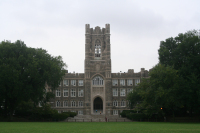According to The New York Times, Fordham ranks 164 out of 200 universities on the College Access Index. This index reviews an institution’s commitment to making college affordable to low-income students. Through a holistic compiling of data like pell grant shares, the graduation rates of students who receive them and the price that lower and middle income students pay, the index deems Fordham’s performance less than impressive.
One can be moderately satisfied that Fordham made it onto this ranking. It shows that the university is making minimal effort to make a prestigious Jesuit education available to those that can not afford it without institutional aid.
However, 163 universities with five-year graduation rates of 75 percent performed better than Fordham.
Some people might contend that, as a private university, Fordham does not have the responsibility that public universities have regarding college affordability for lower income students. They would support this by claiming the administration and financial office’s job lies in providing the best education to students that can afford its steep price tag. Public universities are state funded, and thus must commit to alleviating the financial burdens some must face, whereas private universities are endowed with the privilege of allocating their private money to whatever will increase endowment.
Others, though, might claim that Fordham emits an air of exclusivity and aristocracy. While our campus has diverse Greek and Gothic buildings, the typical Fordham student’s Instagram feed lacks socioeconomic diversity. One might say that Fordham invests more money into aesthetic choices rather than the students that warrant the prestige that demands such stoic buildings.
The top seven universities rated on this list are public schools. However, the next five are private, and there is a homologous mixture throughout the rest of the top rankings of both private and public schools. Why is Fordham not ranked higher?
New York City and the Fordham community are abuzz with excitement with the arrival of the Pope. In fact, it was difficult to ignore the hype of his arrival. People were gathered in the McGinely Center to watch his speeches, and students and faculty alike discussed his arrival with anticipation. After all, it is not everday that a pope processes through our city’s streets.
In speeches to Congress and the United Nations, he espoused typical Catholic ideals like the abolition of both abortion and the death penalty. The highlight of his rhetoric, though, was his preaching of an intrinsically Jesuit Catholic ideal that we should be both compassionate and generous to the poor.
Where, then, is this generosity? Fordham claims to encapsulate the Jesuit tradition of men and women for others. But, we are not for others if our education is only available to a small cohort of society. Intellect does not coalesce into the upper strata of wealth. Those who have prosperous minds should grace the halls of our great school, not those with prosperous wallets.
Some might be OK with the fact that Fordham is not affordable to all. Some might be OK with the effort, or lack thereof, on Fordham’s part to increasing its affordability. I am not.
I am not OK with the concept that perhaps many Fordham students must struggle with both work and school to afford its hefty price tag. I am not OK with the idea that, in order to obtain a Fordham degree, students have to take out overwhelming amounts of student loans that can burden their prosperity for years to come.
The Bronx is one of the most culturally, socially and beautifully diverse urban areas in New York City. Fordham University should parallel that. Fordham’s affordability is indicative of a national problem of augmented college costs.
However, I do believe Fordham can change that tide. I love this school. I wish that all that want to contribute to our intellectual and social community are able. We should invest into the minds of the brightest and greatest students, regardless of wealth or social status.
Theresa Schliep, FCRH ’19, in undecided in her major from Point Pleasant Beach, New Jersey.





